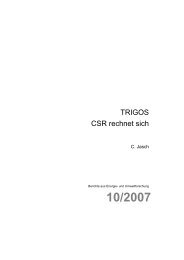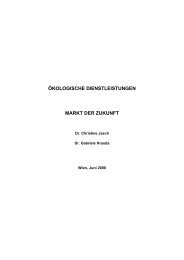Environmental Management Accounting Procedures and Principles
Environmental Management Accounting Procedures and Principles
Environmental Management Accounting Procedures and Principles
Create successful ePaper yourself
Turn your PDF publications into a flip-book with our unique Google optimized e-Paper software.
<strong>Environmental</strong> <strong>Management</strong> <strong>Accounting</strong><br />
<strong>Procedures</strong> <strong>and</strong> <strong>Principles</strong><br />
1. Provisions<br />
Provisions must be made by law for uncertain accounts payable (e.g., pensions, taxes) <strong>and</strong><br />
potential losses from pending business transactions when a company prepares its financial<br />
statements. Provisions are also made for accounts payable the exact amount of which has not<br />
yet been determined (e.g., tax consultancy fees for preparation of financial statements). Other<br />
accepted provisions include provisions for poor maintenance (waste disposal), clean-up of<br />
contaminated sites <strong>and</strong> reforestation (recultivation) which are also admissible under the tax<br />
law.<br />
Provisions may always be made if damage to the environment has already occurred, e.g., in<br />
the case of clean-up of a contaminated site. Provisions for damage which is imminent but has<br />
not yet occurred are usually difficult to assess in compliance with the tax law <strong>and</strong> must<br />
therefore be considered as an imputed risk in cost accounting.<br />
The financial statements list the estimated amounts of all accounts payable while the profit <strong>and</strong><br />
loss accounts show the annual allocation or liquidation of provisions which have altered the<br />
earnings of the business year. More explanations on environmentally relevant provisions are<br />
provided in chapter 4 under item 1.7 of the environmental cost scheme.<br />
2. Accounts payable<br />
Accounts payable for supplies <strong>and</strong> services are incurred by every company from the receipt of<br />
a supplier’s invoice until the day of payment. Sometimes, each supplier has his separate<br />
account <strong>and</strong> the annual sales <strong>and</strong> invoices are stated there collectively, if they are not easily<br />
found in the profit <strong>and</strong> loss accounts. For instance, the total quantity of a given chemical<br />
substance which has been purchased from a supplier may be extracted from that supplier’s<br />
collected invoices registered on his account. The invoices of the disposal firm may be<br />
dispersed across various accounts, but posted collectively into the supplier’s account.<br />
3. Deferred items<br />
This item ensures compliance of the financial statement with the matching principle on the cutoff<br />
date of 31 December <strong>and</strong> is not environmentally relevant.<br />
5.2. Deriving expenditure from the profit <strong>and</strong> loss statement<br />
The profit <strong>and</strong> loss statement may be arranged according to the expenditure or costcategories-oriented<br />
format or to the operational (cost-of-sales) format. In the cost-categoriesoriented<br />
format, all earnings <strong>and</strong> expenses of a period are listed. Operational expenditure is<br />
broken down into material <strong>and</strong> personnel expenditure, depreciation <strong>and</strong> other expenses. The<br />
accumulation <strong>and</strong> clearance of work in process <strong>and</strong> finished goods is determined by a stocktaking<br />
at year-end, assessed at production cost <strong>and</strong> posted as correction of sales revenue.<br />
In the cost-of-sales format, the actual sales of a period are compared only to those expenses<br />
which have been incurred for the manufacture of the products sold. The cost-of-sales format,<br />
therefore, requires a constant collection <strong>and</strong> assessment of inventory increases of finished<br />
-37-




